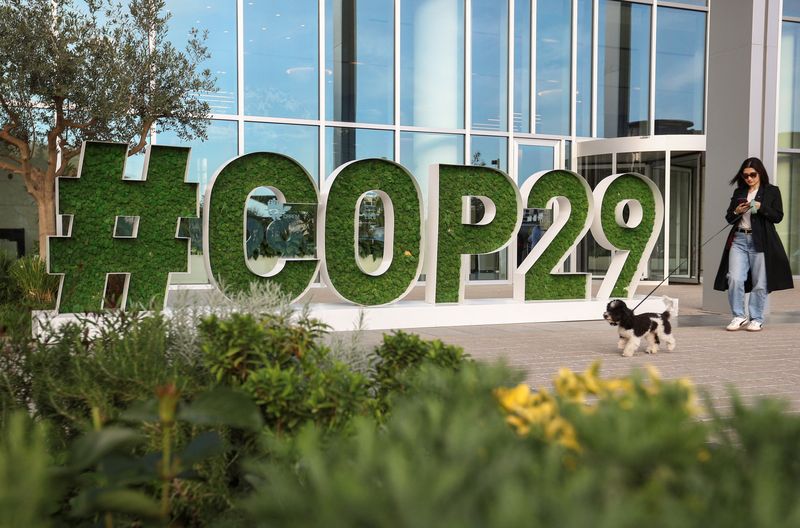
By Valerie Volcovici, Kate Abnett and Gloria Dickie
WASHINGTON (Reuters) – Donald Trump’s victory in the U.S. presidential election has darkened the outlook for a strong deal at the COP29 global climate summit next week and will heap pressure on Europe and China to lead international progress in curbing planetary warming, according to climate negotiators.
Trump, who has called climate change a hoax, has said he plans to withdraw the U.S. from the landmark 2015 Paris climate agreement at the start of his second presidency, and his policy advisors have floated removing the U.S. from the underlying UN Framework Convention on Climate Change (UNFCCC) ratified by the U.S. Senate in 1992.
Climate negotiators and observers preparing for the COP29 conference from Nov. 11-22 in Baku, Azerbaijan, said Trump’s decisive win over Vice President Kamala Harris in Tuesday’s poll deals a blow to the ability of countries to agree a new global finance target, or increase the pool of countries that should contribute – top goals for the summit.
The EU and U.S. had planned to push China and rich Gulf states to start paying into U.N. climate funds.
“Pushing for more ambitious climate finance is going to be almost impossible without the U.S. buy-in, which will de-motivate developing countries from taking seriously the climate ambitions of the West,” said Elisabetta Cornago, a senior research fellow at the Centre for European Reform.
Jennifer Morgan, Germany’s state secretary for international climate action, said it will be up to Germany and the European Union to maintain leadership in the climate finance discussions to ensure an acceptable result.
Failure to land a strong climate finance deal would be a particularly big setback for the 45-country group of Least Developed Countries in U.N. climate negotiations, which is demanding countries pay up.
“Any attempt by anyone to sidestep shared responsibilities must be met with dismay,” said Evans Njewa, chair of the bloc.
TRANSITION WILL SURVIVE
One climate minister from Latin America said that while the return of pro-oil drilling Trump and his likely Paris withdrawal are a setback to global climate efforts, the deployment of renewables is attracting trillions of dollars in investments and will continue despite his political maneuvers.
“The election feels like a slap in the face to climate progress, but it won’t stop the global push for clean energy,” the official said. “Sticking with fossil fuels is a dead end.”
Germany’s Morgan agreed.
“We have seen over the past years, through various election results, that the implementation of the Paris Agreement has gone forward,” she said.
Any weakening in the U.S.’ stance on tackling climate change, however, would make it vital for Europe and China to hold firm. The U.S., China, and the 27-country European Union are the world’s biggest historical polluters.
“If one of the three-legged pillars is wobbling or uncertain, the other two need to hold fast,” a European diplomat told Reuters.
Li Shuo, director of China Climate Hub at the Asia Society Policy Institute, said the loss of U.S.-China political leadership at COP29 and in the future needs to be filled by China and the EU.
“A strengthened climate alliance with Europe and China at the center is our best hope for the next few years,” he said.
U.S. states and cities, meanwhile, are planning to step up and fill the U.S. void at the upcoming climate summit to encourage other countries to keep working toward Paris climate goals.

The U.S. Climate Alliance, America Is All In and Climate Mayors will send delegations to COP29. The groups were formed in 2017 after Trump withdrew the U.S. from the Paris agreement the first time, a move the Biden administration reversed. They represent nearly two-thirds of the U.S. population and three-quarters of U.S. GDP.
A report by the University of Maryland in September found that if Biden administration climate laws and policies are rolled back, non-federal entities like states and cities can achieve a 48% emissions reduction by 2035 – falling short of previous U.S. commitments to reduce greenhouse emissions at least 50% compared to 2005 levels by 2030.
This post is originally published on INVESTING.



